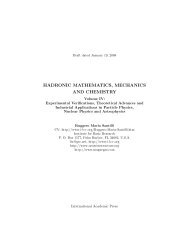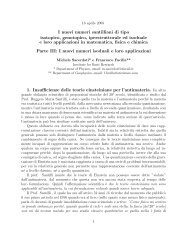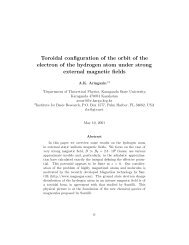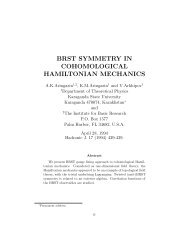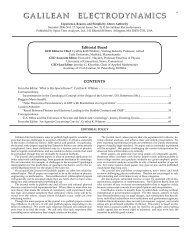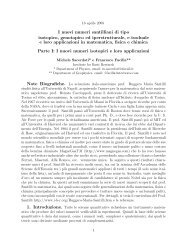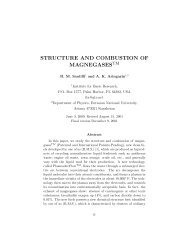the new fuels with magnecular structure - Institute for Basic Research
the new fuels with magnecular structure - Institute for Basic Research
the new fuels with magnecular structure - Institute for Basic Research
Create successful ePaper yourself
Turn your PDF publications into a flip-book with our unique Google optimized e-Paper software.
THE NEW FUELS WITH MAGNECULAR STRUCTURE 11<br />
Again, gasoline is preferable over hydrogen also in regard to <strong>the</strong> ozone layer.<br />
In fact, gasoline is liquid and its vapors are heavy, thus being unable to reach <strong>the</strong><br />
ozone layer. Also, all byproducts of gasoline combustion are heavy and <strong>the</strong>y simply<br />
cannot rise to <strong>the</strong> ozone layer. Assuming that some tornado carries byproducts<br />
of gasoline combustion all <strong>the</strong> way up to <strong>the</strong> ozone layer, <strong>the</strong>y have no known<br />
reaction <strong>with</strong> <strong>the</strong> ozone that could compare <strong>with</strong> that of hydrogen, Eq. (1.1).<br />
D) Alarming environmental problems caused by <strong>the</strong> need to liquify<br />
hydrogen. Gasoline contains about 110, 000 British Thermal Units (BTU) per<br />
gallon (g) while hydrogen contains about 300 BTU per standard cubic foot (scf).<br />
Consequently, <strong>the</strong> “Gasoline Gallon Equivalent” (GGE) is given by 366 scf of<br />
hydrogen. Hence, <strong>the</strong> hydrogen equivalent of an average 20 gallon gasoline tank<br />
would require 7, 320 scf of hydrogen, namely, a volume of hydrogen so big to<br />
require a trailer <strong>for</strong> its transportation in automotive uses.<br />
This is <strong>the</strong> reason all manufacturers testing cars running on hydrogen as a fuel,<br />
such as BMW, GM, Honda, and o<strong>the</strong>rs, have been <strong>for</strong>ced to use liquified hydrogen.<br />
At this point <strong>the</strong> environmental problems caused by use of hydrogen as an<br />
automotive fuel become truly serious, e.g., because hydrogen liquifies close to <strong>the</strong><br />
absolute zero degree temperature, thus requiring large amounts of electric energy<br />
<strong>for</strong> its liquefaction, <strong>with</strong> consequential multiplication of pollution. Additional<br />
significant amounts of energy are needed to maintain <strong>the</strong> liquid state because <strong>the</strong><br />
spontaneous transition from <strong>the</strong> liquid to <strong>the</strong> gas state is explosive <strong>with</strong>out any<br />
combustion (because of <strong>the</strong> rapidity of <strong>the</strong> transition when <strong>the</strong> cooling systems<br />
ceases to operate).<br />
At <strong>the</strong> 2000 Hydrogen World Meeting held in Munich, Germany, under BMW<br />
support, a participant from Florida stated that “If one of my neighbors in Florida<br />
purchases a car operating on liquid hydrogen, I will sell my house because in <strong>the</strong><br />
event that neighbor leaves <strong>the</strong> car parked in his driveway to spend <strong>the</strong> weekend<br />
in Las Vegas, and <strong>the</strong> cooling systems fails to operate due to <strong>the</strong> Florida summer<br />
heat, <strong>the</strong> explosion due to <strong>the</strong> transition of state back to <strong>the</strong> gaseous <strong>for</strong>m will<br />
cause a crater.”<br />
E) Prohibitive hydrogen cost. Commercial grade hydrogen (not <strong>the</strong> pure<br />
hydrogen needed <strong>for</strong> fuel cells) currently retails in <strong>the</strong> USA at $0.18/scf. By<br />
comparison, natural gas retails at about $0.01/scf. But hydrogen contains<br />
300BT U/scf, while natural gas contains 1, 050BT U/scf. Consequently, 1,050<br />
300 ×<br />
$0.18 = $0.63, namely, commercial grade hydrogen currently sells in <strong>the</strong> U.S.A.





